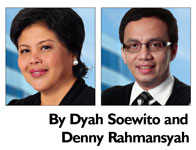 Indonesia’s Agrarian Law provides that foreigners can only acquire right to use (hak pakai) title for land if they reside in Indonesia. If foreign investors wish to engage in business in Indonesia, they must establish a foreign capital investment (PMA) company. A PMA company is able to acquire a right to build (HGB) or a hak pakai title. The HGB or hak pakai title may also be placed over the seller’s pre-existing right of ownership (hak milik) or right to manage (hak pengelolaan) titles. Under the applicable regulation, individual foreigners are allowed to own residential property under the hak pakai title. Specifically, foreigners who provide benefits to national development, reside permanently or temporarily in Indonesia and have proper immigration documents can purchase the following: Issues arise if a foreign investor acquires traditional or customary land (known as adat land). In Indonesia, particularly in rural areas, large areas of land exist that usually are held through a traditional joint community ownership structure and that have not been registered and certificated with the relevant land office under the Agrarian Law. The rights to these areas are still governed by adat or customary law. Adat rules vary significantly from one area to another within Indonesia. Possession of uncertificated land is most often evidenced by a letter (either a surat girik or surat petuk pajak bumi) issued by the head of the relevant sub-district or village to the ‘landowner’ evidencing the payment of local land taxes. Girik (also known as Letter C) is not evidence of land title ownership (the tax authority stopped using girik in 1994). These days, Land and Building Tax (PBB) receipts constitute the only evidence of payment of property tax. In terms of purchasing the land, when uncertificated land is transferred, the buyer must apply for a registered title pursuant to the Agrarian Law and obtain a formal certificate of title. To obtain a land certificate, adat-based proprietary rights must be relinquished by the original owner to the state by signing a right relinquishment deed in favor of the buyer. With this deed, the buyer can then apply to the state for one of the primary titles to the land. Another issue affecting the ownership of property by investors (whether local or foreign) is the presence of public areas or amenities. For example, if there is a river, a public cemetery or a public road within the land area, there may be special rules governing the right of use by other individuals. Likewise, if the land is located in a protected forest area, construction upon such land can usually not be carried out without proper licenses or permission from the relevant government institutions and the community surrounding such areas. The last relevant legal issue would be the exercise of eminent domain powers and land acquisition. The applicable regulation provides that eminent domain powers may be used for construction undertaken and eventually owned by the Government of Indonesia in the public interest in various areas, including in areas where the land is owned by private investors. It should be noted that there are also foreign investment incentives for investment projects in the real estate sector approved by the Capital Investment Coordinating Board (BKPM). These include incentives for investment in remote areas of Indonesia and may consist of accelerated depreciation, special tax treatment and exemption or reduction of import duties. |
SSEK Legal Consultants
14th Floor, Mayapada Tower
Jl. Jend. Sudirman Kav. 28
Jakarta 12920
Indonesia
Tel: (62) 21 304 16700 / 521 2038
Fax: (62) 21 521 2039
Email: dyahsoewito@ssek.com
dennyrahmansyah@ssek.com
Website: https://www.ssek.com

